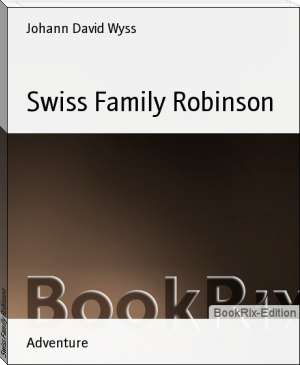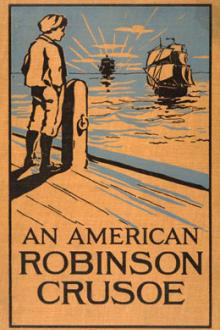Swiss Family Robinson, Johann David Wyss [tools of titans ebook txt] 📗

- Author: Johann David Wyss
- Performer: -
Book online «Swiss Family Robinson, Johann David Wyss [tools of titans ebook txt] 📗». Author Johann David Wyss
made their appearance at a brisk trot, and gave a circumstantial
account of their mission.
*****NOTE: To get supplies, about fourteen paragraphs earlier.
But what else did they do? Something is left out.
I was pleased to see that they had fulfilled their orders
intelligently, carrying out my intentions in the spirit and not
blindly to the letter.
Next morning we quitted the farm (which we named Woodlands), after
providing amply for the wants of the animals, sheep, goats and poultry,
which we left there.
Shortly afterwards, on entering a wood, we found it tenanted by an
enormous number of apes, who instantly assailed us with showers of
fir-cones, uttering hideous and angry cries, and effectually checking
our progress, until we put them to flight by a couple of shots, which
not a little astonished their weak minds.
Fritz picked up some of their missiles, and, showing them to me, I
recognized the cone of the stone-pine.
`By all means gather some of these cones, boys,’ said I; `you will find
the kernel has a pleasant taste, like almonds, and from it we can, by
pressing, obtain an excellent oil. Therefore I should like to carry
some home with us.’
A hill, which seemed to promise a good view from its summit, next
attracted my notice, and, on climbing it we were more than repaid for
the exertion by the extensive and beautiful prospect which lay spread
before our eyes.
The situation altogether was so agreeable, that here also I resolved to
make a settlement, to be visited occasionally, and, after resting
awhile and talking the matter over we set to work to build a cottage
such as we had lately finished at Woodlands.
Our experience there enabled us to proceed quickly with the work, and
in a few days the rustic abode was completed, and received, by Ernest’s
choice, the grand name of Prospect Hill.
My chief object in undertaking this expedition had been to discover
some tree from whose bark I could hope to make a useful light boat or
canoe. Hitherto I had met with none at all fit for my purpose, but, not
despairing of success, I began, when the cottage was built, to examine
carefully the surrounding woods, and, after considerable trouble, came
upon two magnificent tall straight trees, the bark of which seemed
something like that of the birch.
Selecting one whose trunk was, to a great height, free from branches,
we attached to one of the lower of these boughs the rope ladder we had
with us, and, Fritz ascending it, cut the bark through in a circle; I
did the same at the foot of the tree, and then, from between the
circles, we took a narrow perpendicular slip of bark entirely out, so
that we could introduce the proper tools by which gradually to loosen
and raise the main part, so as finally to separate it from the tree
uninjured and entire. This we found possible, because the bark was
moist and flexible.
Great care and exertion were necessary, as the bark became detached, to
support it, until the whole was ready to be let gently down upon the
grass. This seemed a great achievement; but our work was by no means
ended, nor could we venture to desist from it, until, while the
material was soft and pliable, we had formed it into the shape we
desired for the canoe.
In order to do this, I cut a long triangular piece out of each end of
the roll, and, placing the sloping parts one over the other, I drew the
ends into a pointed form and secured them with pegs and glue.
This successful proceeding had, however, widened the boat, and made it
too flat in the middle, so that it was necessary to put ropes round it,
and tighten them until the proper shape was restored, before we could
allow it to dry in the sun.
This being all I could do without a greater variety of tools, I
determined to complete my work in a more convenient situation, and
forthwith dispatched Fritz and Jack with orders to bring the sledge
(which now ran on wheels taken from gun-carriages) that the canoe might
be transported direct to the vicinity of the harbour at Tentholm.
During their absence I fortunately found some wood naturally curved,
just suited for ribs to support and strengthen the sides of the boat.
When the two lads returned with the sledge, it was time to rest for the
night; but with early dawn we were again busily at work.
The sledge was loaded with the new boat, and everything else we could
pack into it, and we turned our steps homewards, finding the greatest
difficulty, however, in getting our vehicle through the woods. We
crossed the bamboo swamp, where I cut a fine mast for my boat, and came
at length to a small opening or defile in the ridge of rocks, where a
little torrent rushed from its source down into the larger stream
beyond; here we determined to make a halt, in order to erect a great
earth wall across the narrow gorge, which, being thickly planted with
prickly pear, Indian-fig, and every thorny bush we could find, would in
time form an effectual barrier against the intrusion of wild beasts,
the cliffs being, to the best of our belief, in every other part
inaccessible.
For our own convenience we retained a small winding path through this
barrier, concealing and defending it with piles of branches and thorns,
and also we contrived a light drawbridge over the stream, so that we
rendered the pass altogether a very strong positron, should we ever
have to act on the defensive.
This work occupied two days, and continuing on our way, we were glad to
rest at Falconhurst before arriving (quite tired and worn out) at
Tentholm.
It took some time to recruit our strength after this long and
fatiguing expedition, and then we vigorously resumed the task of
finishing the canoe. The arrangements, I flattered myself, were
carried out in a manner quite worthy of a shipbuilder; a mast, sails
and paddles were fitted, but my final touch, although I prized it
highly and considered it a grand and original idea, would no doubt have
excited only ridicule and contempt had it been seen by a naval man.
My contrivance was this: I had a couple of large airtight bags, made
of the skins of the dog-fish, well tarred and pitched, inflated, and
made fast on each side of the boat, just above the level of the water.
These floats, however much she might be loaded, would effectually
prevent either the sinking or capsizing of my craft.
I may as well relate in this place what I omitted at the time of its
occurrence. During the rainy season our cow presented us with a
bull-calf, and that there might never be any difficulty in managing
him, I at a very early age, pierced his nose and placed a short stick
in it, to be exchanged for a ring when he was old enough. The question
now came to be, who should be his master, and to what should we train
him?
`Why not teach him,’ said Fritz, `to fight with wild animals and
defend us, like the fighting bulls of the Hottentots? That would be
really useful!’
`I am sure I should much prefer a gentle bull to a fighting one!’
exclaimed his mother. `But do you mean to say tame oxen can be taught
to act rationally on the defensive?’
`I can but repeat what I have heard or read,’ replied I, `as regards
the race of Hottentots who inhabit the south of Africa, among all sorts
of wild and ferocious animals.
`The wealth of these people consists solely in their flocks and herds,
and for their protection, they train their bulls to act as guards.
`These courageous animals keep the rest from straying away, and when
danger threatens, they give instant notice of it, drive the herd
together in a mass, the calves and young cows being placed in the
centre; around them the bulls and strong oxen make a formidable circle
with their horned heads turned to the front, offering determined
resistance to the fiercest foe.
`These fighting bulls will even sometimes rush with dreadful bellowing
to meet the enemy; and should it be a mighty lion or other strong and
daring monster, sacrifice their own lives in defence of the herd.
`It is said that formerly, when Hottentot tribes made war on one
another, it was not unusual to place a troop of these stout-hearted
warriors in the van of the little army, when their heroism led to
decisive victory on one side or the other.
`But,’ continued, I, `although I can see you are all delighted with my
description of these fine warlike animals, I think we had better train
this youngster to be a peaceable bull. Who is to have charge of him?’
Ernest thought it would be more amusing to train his monkey than a
calf. Jack, with the buffalo and his hunting jackal, had quite enough
on his hands. Fritz was content with the onager. Their mother was voted
mistress of the old grey donkey. And I myself being
superintendent-in-chief of the whole establishment of animals, there
remained only little Franz to whose special care the calf could be
committed.
`What say you, my boy—will you undertake to look after this little
fellow?’
`Oh yes, father!’ he replied. `Once you told me about a strong man, I
think his name was Milo, and he had a tiny calf, and he used to carry
it about everywhere. It grew bigger and bigger, but still he carried it
often, till at last he grew so strong that when it was quite a great
big ox, he could lift it as easily as ever. And so you see, if I take
care of our wee calf and teach it to do what I like, perhaps when it
grows big I shall still be able to manage it, and then—oh, papa—do
you think I might ride upon it?’
I smiled at the child’s simplicity, and his funny application of the
story of Milo of Crotona.
`The calf shall be yours, my boy. Make him as tame as you can, and we
will see about letting you mount him some day; but remember he will be
a great bull long before you are nearly a man. Now what will you call
him?’
`Shall I call him “Grumble”, father? Hear what a low muttering noise he
makes!’
`“Grumble” will do famously.’
`Grumble, Grumble. Oh, it beats your buffalo’s name hollow, Jack!’
`Not a bit,’ said he, `why, you can’t compare the two names. Fancy
mother saying, “Here comes Franz on Grumble, but Jack riding on the
Storm.” Oh, it sounds sublime!’
We named the two puppies Bruno and Fawn, and so ended this important
domestic business.
For two months we worked steadily at our salt-cave, in order to
complete the necessary arrangement of partition walls, so as to put the
rooms and stalls for the animals in comfortable order for the next long
rainy season, during which time, when other work would be at a
standstill, we could carry on many minor details for the improvement of
the abode.
We levelled the floors first with clay; then spread gravel mixed with
melted gypsum over that, producing a smooth hard surface, which did
very well for most of the apartments; but I was ambitious of having one
or two carpets, and set about making a kind of felt in the following
way.
I





Comments (0)